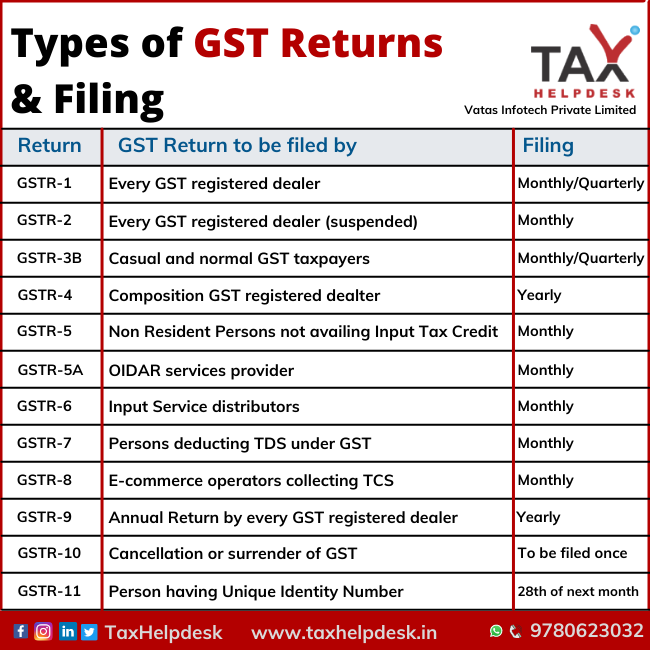Under GST, there are 11 types of GST Returns. The taxpayers under the GST regime have to file GST returns depending upon the type of supply of goods or services as well as annual turnover.
What is GST Return?
GST Return is a return that contains the details of input (purchases), output (sales), input tax (tax on purchases), and output tax (tax on sales). The filing of these returns is either monthly or quarterly and annually by the taxpayers under the Goods and services tax in India.
Also Read: GST Registration on the basis of State and Turnover
Types of GST Returns
GSTR-1: GSTR-1 is a monthly or quarterly return. It contains details of all outward supplies made by the taxpayer. It includes information about sales and other supplies made to other taxpayers (B2B), as well as supplies made to consumers (B2C). This return helps in the reconciliation of input tax credit and output tax liability.
GSTR-3B: GSTR-3B is a summary return that taxpayers need to file monthly. It is a simple return where businesses report their total sales, eligible input tax credit, as well as the total amount of tax payable for the month. Having said this, GSTR-3B serves as a self-assessment of the tax liability for that period.
GSTR-4: GSTR-4 is an annual return that the taxpayers opting for the Composition Scheme file under GST. Businesses opting for this scheme pay tax at a lower rate but cannot claim input tax credit. This return provides a summary of their outward supplies, inward supplies, and tax liability.
GSTR-5: GSTR-5 is a return that the non-resident taxpayers, who provide taxable goods or services in India but do not have a fixed place of business here, file. It contains details of their sales, tax liability, as well as any tax collected at source (TCS).
GSTR-6: GSTR-6 is a return that the Input Service Distributors (ISDs) file. An ISD is an office of a taxpayer that receives invoices for services that its branches have made use of. It then distributes the input tax credit to those branches. GSTR-6 contains information about input tax credit distribution to various units.
GSTR-7: GSTR-7 is a return that the taxpayers who deduct TDS file under Goods and service tax. It contains details of the amount of TDS as well as deposits with the government, along with the TDS certificates.
GSTR-8: GSTR-8 is a return that the e-commerce operators who collect TCS under GST, file. E-commerce operators collect a percentage of the transaction value as TCS while making payments to suppliers on their platforms. GSTR-8 contains details of the TCS collected and payable.
GSTR-9: GSTR-9 is an annual return that provides a comprehensive summary of all the monthly/quarterly returns filed during a financial year. It includes details of outward and inward supplies, input tax credits, taxes payments, and any additional information.
GSTR-10: GSTR-10 is filed by taxpayers whose GST registration has been canceled or surrendered. It is a one-time return that needs to be filed within three months of the date of cancellation or the date of the cancellation order, whichever is later.
GSTR-11: GSTR-11 is a return that entities with a Unique Identification Number (UIN) file. UIN holders include foreign diplomatic missions and embassies that are not liable to pay goods and services tax (GST) but can claim a refund of the GST payments on their purchases in India. GSTR-11 contains details of such purchases as well as refund claims.
GST Returns, Type, Filing Entities & Due Date
| GST Return | Type | Filing Entities | Due Date |
|---|---|---|---|
| GSTR-1 | Outward Supplies Return | Regular taxpayers | 11th of the following month |
| GSTR-3B | Summary Return | Regular taxpayers | 20th of the following month |
| GSTR-4 | Quarterly Return | Composition scheme taxpayers | 18th of the month succeeding quarter |
| GSTR-5 | Non-Resident Taxpayer’s Return | Non-resident taxpayers | 20th of the following month |
| GSTR-6 | Input Service Distributor Return | Input Service Distributors (ISDs) | 13th of the following month |
| GSTR-7 | TDS (Tax Deducted at Source) Return | Tax Deductors | 10th of the following month |
| GSTR-8 | TCS (Tax Collected at Source) Return | E-commerce operators | 10th of the following month |
| GSTR-9 | Annual Return | Regular taxpayers | 31st December of the subsequent year |
| GSTR-10 | Final Return | Canceled or surrendered taxpayers | Within 3 months from cancellation |
| GSTR-11 | Inward Supplies Statement for UIN | UIN holders (e.g., foreign missions) | 28th of the following month |
*The due dates may be subject to change.
Mark your calendars today or just get in touch with our experts at TaxHelpdesk to get all your Return filed!
If you have any suggestions/feedback, then please leave the comment below. For more updates on Taxation, GST consultation, Financial and Legal matters, join our group on WhatsApp. You can also follow us on Facebook, Instagram and Linkedin!



Pingback: GST Compliances for August, 2021 | TaxHelpdesk
Pingback: Rules related to setting off of Input Tax Credit | TaxHelpdesk
Pingback: GST Return Filing Process: A Step by Step Guide | TaxHelpdesk